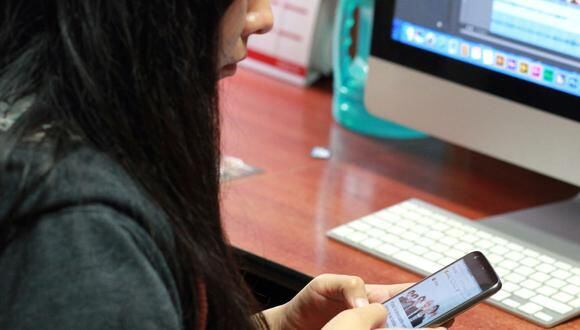Suddenly, while attending her hairdresser, Teresa García received a message on Facebook Messenger. From her profile picture and what she was telling him, she believed it was from her friend Marlene of hers, whom she hadn’t seen in years. She had migrated to the United States a long time ago.
At the beginning, and as in any conversation between two people who speak to each other after a while, the greetings were formal. There were questions about family, health, how they had passed the pandemic.
LOOK: This is how cybercrime works in Peru: phishing attacks quintupled in a year
Until that moment, Teresa had not realized that it was a fake account. The name of her friend and the photo of her were true, so she did not hesitate. At 58, she is not very attentive to those details either.
“She spoke to me as if I were really her, with words of affection and blessings,” comment. “Honestly, it never occurred to me to doubt”comments to El Comercio.
After touching on the subject of the covid, the supposed friend expressed the reason for her communication. She was planning to come to Peru and wanted to bring gifts for friends and family, but due to the pandemic, everything had become more strict at airports, she said. So I wanted to ask Teresa, please, to receive the suitcase for her, at her home.
The protagonist of this story didn’t think it was so difficult to lend her name and address to help an old friend, so she accepted.
The problems began shortly after, when she was contacted by a man who identified himself as an agent of a well-known airline. He approached her through a WhatsApp call. The subject explained that the suitcase had been detained at customs and they asked him for an amount of 9 thousand soles to clear it.
“I wrote to Marlene to tell her what had happened. At that moment I made him notice my discomfort. I wanted to support her, but I didn’t want to get into trouble and paperwork.”points out.
However, the friend managed to persuade her. She begged him not to leave the suitcase behind. She even sent him a receipt with a transfer from abroad for the requested amount. Teresa did not suspect that it was a false document.
Then came the real headache. “The agency called me to let me know that they had found contraband watches in the suitcase, they even sent me photos on WhatsApp and everything.”.
The guy behind the phone blackmailed her. She told him that she was already involved and that they might even stop her. This last obviously startled her. The only “her solution” for her was to collaborate with him so that he “helps” her to go unnoticed. That way, began an avalanche of requests for money.

“Everything happened very fast. I didn’t know how to handle it. In the end I ended up losing more than 50 thousand soles [más de 12 mil dólares] thinking i was helping a friend. The worst thing is that not only did I use my savings, I also had to ask for two loans”.
On the other side of the screen, the false friend also pressured her to collaborate so they could get out of that situation as soon as possible, always with the idea that she would come and fix the situation.
LOOK: Beat: History and controversies of the travel app that can no longer be used in Peru, Mexico and Argentina
the fake aunt
Melissa Castro, 27, was also about to be a victim of this modality. In her case, communication with the scammers even lasted three months. Around that time she remembers that she was about to give birth.
Melissa has an aunt who has lived in Germany for a long time. She usually comes to the country and brings gifts to her nephews, but due to the pandemic she had not been able to do so.
“He contacted me through Facebook Messenger, an application that I don’t usually use. He took the trouble to write to me frequently. Other times he just sent me stickers. Since I don’t log into the app much, sometimes I would reply after weeks. But until that moment I did not doubt that it was about her “tells this newspaper.

The conversations seemed so natural to her that the young woman even told her how she was doing at work, with her husband and about her pregnancy. “I even sent her the ultrasound of my baby”remember.
Suddenly, his supposed relative tells him that he has planned to come to the country, since he had a flight that he had bought since before the pandemic and he planned to use it to bring gifts. Then heThe story becomes very similar to the previous case. Due to covid restrictions, it was difficult to carry a lot of luggage at the airport, so he asked for his support so that he could send the parcel directly to his address.
Shortly after giving her approval, Melissa began receiving calls informing her that the bag was over the customs limit and that if he wanted to get it back, he had to pay 12,750 soles. They gave him a few hours to make the payment.
“They told me that what was sent exceeded 25 thousand dollars. Supposedly they were electronic devices such as laptops and cell phones.comment. “I wrote to my aunt to notify her and she asked me to make the payment, that she was making a transfer, but since I was doing it from abroad it was going to take 48 hours to get to me”.
When she was called by customs, they also tried to intimidate her by telling her that she was also involved, and that if things go wrong there could be consequences. Just like she happened to Teresa.
Tired of the situation, she decided to call her relative in Germany. Seeing that she did not answer her WhatsApp calls, that she made excuses for not answering and that she kept insisting that she not leave her suitcase forgotten, the young woman began to contact her various relatives to clarify the situation. He was shocked when he found out that his real aunt was never involved. They were fake profiles.
LOOK: WhatsApp: the cell phones on which the app will no longer work from November 30
Internet is still no man’s land

“Today, we classify as a web threat everything that refers to scams, from the simplest such as impersonations or deception to the complex ones that involve malicious software”Martina López, computer security researcher at ESET Latin America, comments to this newspaper.
The specialist explains that no matter how simple these scams are, they are classified as a cybercrime, since the means by which they are carried out is cybernetic. Criminals take advantage of many features of the Internet, particularly anonymity, how easy it is to promise things, how easy it is to impersonate a well-known person or even a company.
This type of attack is known as phishing through social networks. In this mode, cybercriminals can break into social media accounts and force people to send malicious links to their friends. Others create fake profiles and use them to trick their victims. The cases of Teresa and Melissa belong to the latter type.
The suitcase scam is not new, in fact, several international media have reported similar situations. Depending on the place, the characteristics of the deception may vary, but the dynamics are the same: a relative or friend asking for help to be able to send luggage from abroad.
The criminals search among the contacts of their victims and, by accessing the public information available on their social networks, manage to obtain some information. They send messages to so many people that they know that someone can always fall.
“These criminals, these scammers have that ability to subject them to evil. The story of the suitcase, the story of the customs agents who have detected some illicit money in a shipment they have made. They have found 175 cases, of which we would be talking about more than 4 million soles”, The head of the Dirincri, PNP General Carlos Céspedes, told the Cuarto Poder program last October.
Specialists recommend in these cases verify the authenticity of the profiles with whom you speak, therefore, get in touch with the friend or family member through another channel to verify that, indeed, they are who they say they are. The same way, Do not make transfers without first having verified the information with the corresponding entities.
Source: Elcomercio
I have worked as a journalist for over 10 years and have written for various news outlets. I currently work as an author at 24 News Recorder, mostly covering entertainment news. I have a keen interest in the industry and enjoy writing about the latest news and gossip. I am also a member of the National Association of Journalists.

:quality(75)/cloudfront-us-east-1.images.arcpublishing.com/elcomercio/PIAHDSTMVZD43AABSCTF5Q67NA.jpg)





